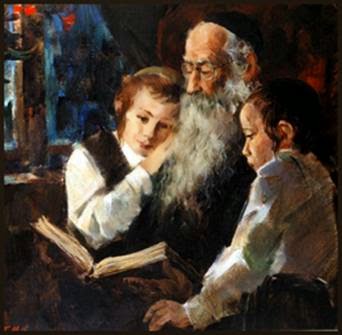 |
| Yohanan ben Zakkai |
He found himself constantly arguing with the Sadducees and the Zealots, an anti-Roman group who figured heavily in the uprising of 70 c.e. Yohanan was known as a pious and pacifistic rabbi who ran his own school in Jerusalem at the time of the Roman invasion and siege. Like many Pharisees, he had specific interpretations of the Bible and predicted the doom of the Temple. To escape the city he feigned his own death and was carried out in a coffin.
Vespasian received him as a religious holy man and allowed him to run an academy of scholars and rabbis in Yavneh until his death in 80 c.e. In the literary framework laid out in rabbinic documents, both Vespasian and Yohanan are stereotypes representing Israel and rabbinism and Rome and the Gentiles.
In fact, Yohanan was supposed to have prophesied to Vespasian—like the mighty prophet Jeremiah—that he would be the new Caesar. The point of the stereotypical story is that Yohanan and his band of rabbis were a prophetic movement that accurately interpreted the Bible in real-world ways and were respected by the Romans.
  |
From the time of Yohanan until the time of Bar Kokhba, the city of Yavneh was a cultural and spiritual center for Jews in Palestine. There Yohanan is alleged to have formed his disciples and to have carried out the religious duties of the Law, good deeds, and prayer. In reality Yavneh allowed Jews to reformulate a vision for their faith.
There the Mishnah was put together as the religious constitution of what would become rabbinic Judaism. Late 19th-century German historians proposed that Yavneh was the place where Yohanan’s council of rabbis took decisive actions to formalize their faith.
Based on flimsy rabbinic evidence they persuaded the world that the rabbis, between the days of Yohanan ben Zakkai and Eleazar ben Azariah (90 c.e.), chose the books that made up the Jewish Bible, chose which texts represented the true biblical texts (and rejected all other texts as deviant), and formally excluded the Christians as heretics from the faith. In short, Yavneh’s supposed decrees became for these historians the symbol of the Jewish response to a world without temple, holy city, or holy land—in the absence of solid evidence.
Yohanan’s own contributions to the deliberation, recorded by the rabbis, cannot be ascertained exactly. However, one of his important assertions was that sages had more practical authority than priests. The authority covered such things as Sabbath customs and festal and calendar observances. This position would serve Jews well in the years after 70 c.e., when keeping temple holiness in homes and villages had to serve when no temple sacrifice could be made.
The legends about him suggest that he restrained messianic fervor, urged obedience to the Law as a response to defeat, and taught that good deeds atoned for sin in a world without the Temple. After Yohanan retired from the council of rabbis at Yavneh, Gamaliel II succeeded him.
Gamaliel II formalized the role that Yohanan played at Yavneh when he was recognized as "prince" by provincial Roman authorities and made his own official visit to Rome in company with other rabbinic scholars. More important, rabbis who did not initially participate at Yavneh now began to look to Gamaliel and his rabbis for leadership.
Yohanan is so revered in later rabbinic Judaism that he is simply called "Rabban" in the documents, meaning "Our Teacher". Modern-day rabbinic Jews consider him their founding father in the faith. He also is one of the most quoted rabbis in the Talmud.
Despite all the legends told about him in the later Jewish writings, scant first-rate historical records exist about him. History’s recollection of him is based on mythical reports written centuries later.